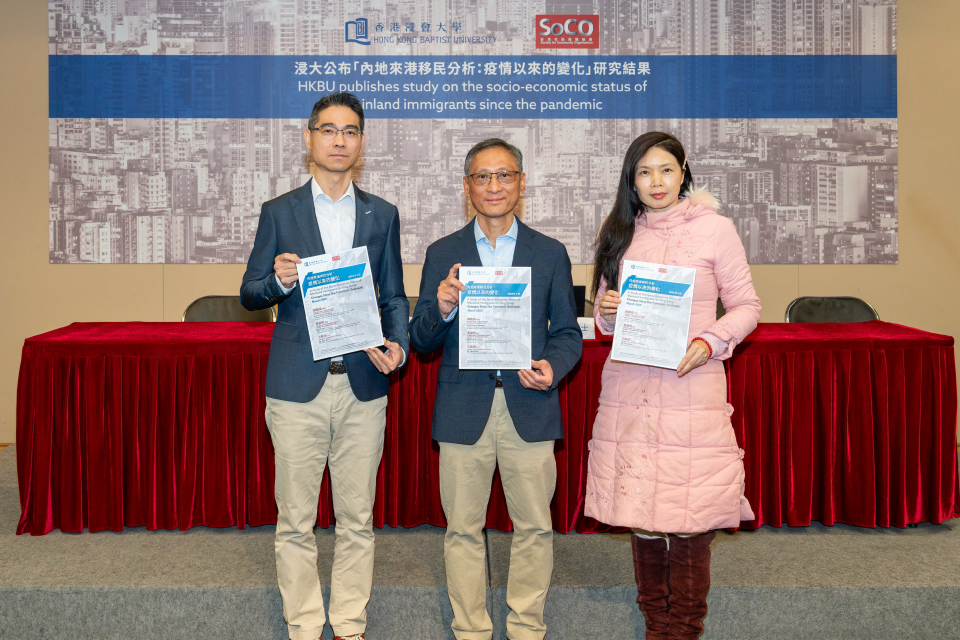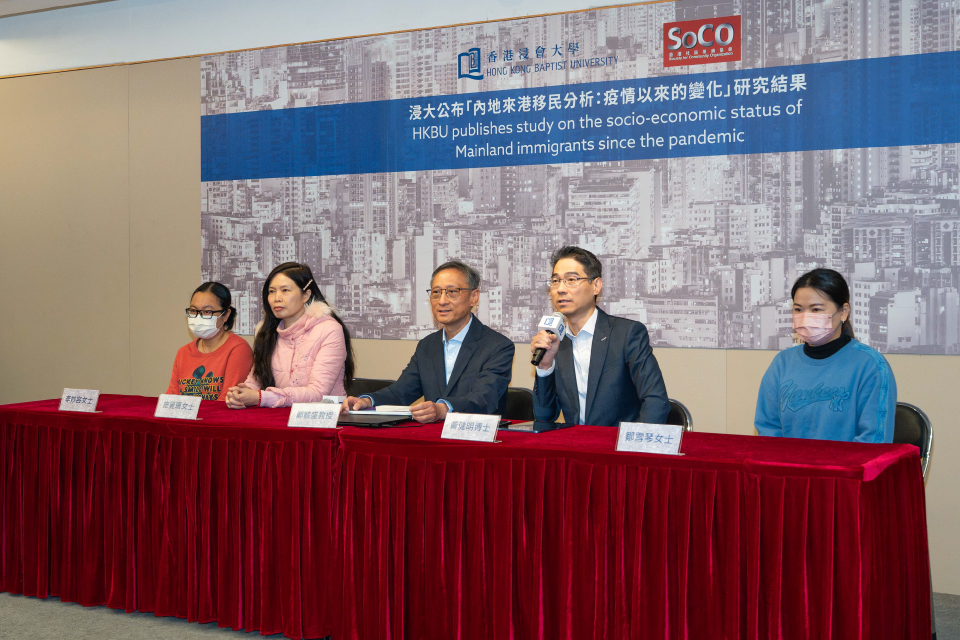Discover HKBU
HKBU study reveals post-pandemic income and employment challenges for low-income Mainland immigrants
31 Mar 2025
The impact of the pandemic on the global economy and the livelihoods of people has not yet been fully mitigated. As people from different stratum in Hong Kong seek opportunities for recovery in the post-pandemic era, they continuously face challenges. The Centre for Sustainable Development Studies (CSDS) of the School of Business at HKBU conducted a study on the socio-economic status of Mainland immigrants since the pandemic, commissioned by the Society for Community Organization (SoCO). The study unveiled that there have been declines in the employment rate and earnings among grassroots Mainland immigrants since 2019, revealing the prolonged impact brought about by the pandemic.
Professor Cheng Yuk-shing, Director of CSDS and Professor of the Department of Accountancy, Economics and Finance at HKBU, along with Dr Aries Wong Kin-ming, Associate Director (Knowledge Transfer) of CSDS and Senior Lecturer of the Department of Accountancy, Economics and Finance, led the research team from CSDS in analysing the data from the 2021 Population Census and other historical data. They incorporated the survey results from SoCO's 3,236 working-age Mainland immigrant members to understand the impact of the COVID-19 pandemic on this demographic.
Income and employment rates drop below pre-pandemic levels
The analysis showed 65% of the grassroots Mainland immigrants surveyed earned a lower income in 2024 than in 2019, including 21% of those who were unemployed. The median income of this group during the early pandemic period in 2020 was HK$14,769, reflecting a 4% decrease from the pre-pandemic levels observed in 2019. The median income was HK$15,023 for the first nine months in 2024, which marked a 3% shortfall compared to pre-pandemic figures. The research also revealed that more than half of the grassroots Mainland immigrants who were unemployed at the beginning of the pandemic remained jobless by 2024, or earned less than the pre-pandemic income levels. The research team believes that this reflects the concept of "hysteresis unemployment” in economics, showing that the impact of the pandemic on grassroots Mainland immigrants is long-term.
Impact on employment for new immigrant mothers and the arrival of school-age children
The study highlighted the critical challenges faced by Mainland immigrant mothers during the pandemic, particularly due to school suspension. Many of these mothers had to stay at home to take care of their children as they lacked comprehensive family support networks. The employment rate of Mainland immigrant mothers with children aged 6-15 plummeted from 39% in 2016 to 30% during the pandemic in 2021, which was three times the decrease in the employment rate of locally born mothers.
Additionally, the research indicated that the pandemic has delayed the arrival of school-age children from the Mainland, which could adversely affect their chances of pursuing university education in the long run. According to the statistics from the Education Bureau, the number of Mainland students enrolling in local primary and secondary schools for the first time dropped significantly from an annual average of 7,951 in 2018-2019 to 3,832 in 2020-2022.
Mainland immigrants’ contribution to the local labour force
The data in 2021 revealed that the median age of Mainland immigrants arriving in Hong Kong over the past two decades was 39.6 years, significantly younger than the overall population median age of 47.3 years. This has helped alleviate the problem of population ageing in the city. Furthermore, the demand for labour in the healthcare sector surged during the pandemic, in addition to a notable increase in the employment rate of low-education-level Mainland female immigrants in this field, demonstrating their valuable contribution to Hong Kong's labour force.
Policy recommendations to enhance family support for re-employment
Professor Cheng Yuk-shing expressed concerns regarding the long-term implications of the pandemic on low-income Mainland immigrants, saying that immediate relief is necessary to address their pressing needs. He advocated for targeted measures to assist this demographic in re-entering the job market, which could effectively mitigate poverty levels in Hong Kong.
Dr Aries Wong emphasised the need for society to provide more support to new immigrant mothers in their efforts to join the workforce. The research team also recommended that the Government consider the future impact of Mainland immigrants on Hong Kong's demographic structure and labour market when formulating population and labour force policies.

